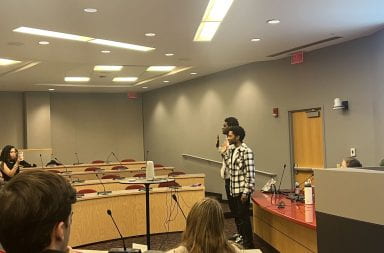The Ohio Inspector General’s office released a report last week saying the Ohio Department of Transportation may have overpaid nearly $60 million for salt over the last decade.
Former Gov. Ted Strickland launched the two-year investigation in February 2009 after salt prices were found to have increased from 19 percent to 236 percent, depending on the county, from the previous year. The report found that ODOT overpaid between $47 million to $59 million throughout the last 10 years.
Anti-competitive bidding and marketing practices created a duopoly between the two major salt suppliers for the state, Cargill Deicing Technology and Morton Salt Company. The report attributes the spike in price to the duopoly, among other reasons, including ODOT’s misinterpretation of the Buy Ohio statute.
The statute “gives a financial preference to companies that do business in Ohio,” according to the report. But ODOT interpreted Buy Ohio to mean companies without Ohio-mined salt would be excluded from a bid, even if their price is lower. This is called “lockout bidding,” and allowed Cargill and Morton, who both supply Ohio-mined salt, to win the majority of bids, the report said.
The report also highlights that the two companies did not bid against each other for counties in the state, instead allowing for “primary” clients that Cargill expects to win and “secondary” clients with which the company bids high, and would be “surprised” to win. Morton won the majority of these “secondary” clients.
The report also states that it “failed to find evidence that the two companies communicated on salt bids.”
The OIG’s office asked ODOT and the Department of Administrative Services to respond in 60 days.
Cargill spokesman Mark Klein said the price of rock salt reflected supply and demand factors, not questionable bidding practices.
“During the winter of 2008-09, road salt prices rose in many parts of the country, including Ohio, because of low carryover stocks from the previous winter and extremely high demand for rock salt across the Snow Belt,” Klein said in an e-mail.
There was no duopoly in rock salt because Cargill would never talk with its competitors about bids, Klein said. The companies never bid against each other because Cargill does not produce enough salt to supply all of Ohio’s 88 counties.
The report also claims there were 115 instances in which Cargill did not actually supply Ohio-mined salt. Klein said there were only two instances when Louisiana-mined salt was used to “make sure our customers had enough salt to make driving safe,” but their records only go back to 2002-03.
Cargill said they are disappointed with the report, as the Inspector General ignored the evidence supplied.
“We cooperated with OIG for 20 months, produced more than 50,000 documents encompassing virtually every aspect of our business in Ohio from 1999 to the present day, chased down every theory of alleged malfeasance by Cargill, and provided witnesses to answer questions under oath,” Klein said.
Morton could not be reached for comment, but issued a press release last week that said it disagreed with the report.
“In Ohio and everywhere else, we compete independently and fairly under the bidding procedures set out by the relevant procurement officials,” the release said.
OSU purchases its salt through the State of Ohio contract from state contractor, Morton Salt, said Peter Calamari, central services leader for Facilities Operations and Development. OSU has a salt storage hut on West Campus that holds about 700 tons of salt.
This year, OSU plans to purchase 2,000 tons of salt throughout the year for $78.64 per ton. OSU and Franklin County have separate salt-purchasing contracts with the state.
Unlike some other counties, Franklin County did not see a substantial rise in salt rock prices over the last year. The county has purchased salt through Cargill since the 2008-09 winter weather season.
In 2008-09, Franklin County paid $62.25 per ton, in 2009-10, $57.87 per ton and in 2010-11, $58.98 per ton.
Greg Payne, assistant administrator for the Franklin County Engineer’s Office, said they have “always thought the small increases are due to inflation.”
“We don’t believe we’ve been manipulated,” Payne said. “Our office has followed the market regarding salt prices, but $58.98 seems to be a fair price from our perspective.”
Attempts to contact the OIG’s office Wednesday evening were not answered.


